The emergence of streaming players like Roku has brought forth the promise of an extensive array of content catering to diverse preferences. With Roku, the ability to stream and download a multitude of content in real-time becomes accessible.
This naturally leads to a contemplative query: Is there a necessity for smart TVs to incorporate Roku?
Let’s delve into this matter to uncover the answers.
How can a Roku benefit a smart TV?
Having Roku integrated into your smart TV grants you entry into a vast realm of both audio and video content, all at your disposal without cost. Additionally, the Roku player facilitates complete access to subscription-based channels.
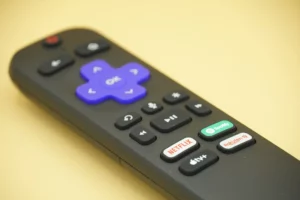
In essence, a smart TV outfitted with Roku elevates the content spectrum significantly. It introduces access to channels that might not be compatible with the smart TV’s native capabilities but are readily available via Roku.
Furthermore, the incorporation of Roku onto a smart TV ushers in a dedicated streaming app, streamlining the navigation of the smart TV’s user interface.
Yet, the truth remains: While having Roku on your smart TV brings a sense of coolness, it stands as an accessory rather than a necessity.
Do smart TVs include an in-built Roku?
Indeed, the integration of Roku is found in only a select number of smart TVs.
Among the smart TVs equipped with built-in Roku are the TCL 4-Series Roku TV, TCL 6-Series Roku TV, and Hisense R8F Roku TV.
For those smart TVs that lack the Roku operating system, the option remains to download the Roku Channel app, providing a glimpse into the Roku experience. However, it’s important to note that the versatility and range of services offered by a dedicated Roku device are unparalleled, surpassing what can be achieved through mere app integration.
Does a smart TV eliminate the need for a streaming device?
The answer is simple: not essential.
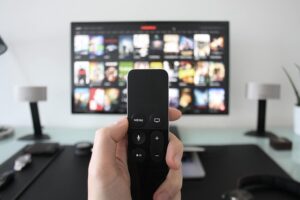
Having a smart TV eliminates the need for a separate streaming device like the Roku player. The capabilities of a smart TV extend to streaming virtually any content you desire.
Should you wish to explore Roku on your smart TV, you can opt to download the Roku Channel app for a taste of its offerings.
Furthermore, relying solely on your smart TV proves to be a more cost-effective route, as many streaming devices involve ongoing monthly payments. Consequently, choosing a smart TV stands as a practical and economical decision.
Roku vs. Smart TV: Understanding the Distinctions
Roku and smart TVs present distinct avenues for accessing and enjoying digital content. Each option possesses its own set of characteristics, catering to varying preferences and requirements.
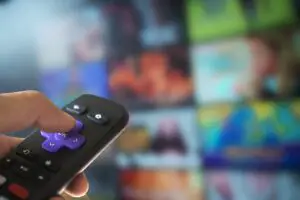
Roku: A Separate Streaming Device Roku stands as a dedicated streaming device, distinct from the smart TV itself. Available for separate purchase, it serves as an external gateway to an expansive universe of digital content. Once connected to a compatible TV, Roku offers users a wider scope of content options compared to the inherent capabilities of smart TVs. This broader access encompasses a variety of streaming platforms, channels, and applications, delivering a diverse range of entertainment possibilities. The plug-and-play nature of Roku facilitates ease of use, enabling users to connect and start streaming with minimal setup.
Smart TV: Integrated Apps and Internet Connectivity In contrast, a smart TV is a self-contained unit equipped with built-in internet connectivity and pre-installed applications. Users can access various streaming platforms and content directly through these integrated apps. However, the scope of content choices may be comparatively more limited than that offered by Roku. The convenience of a smart TV lies in its seamless integration of internet capabilities and applications, eliminating the need for external devices.
Key Differences: Roku vs. Smart TV
| Roku | Smart TV |
|---|---|
| Wider access to content | Limited choices for content |
| Good audio and visual quality | Better audio and visual quality |
| Plug and play | Requires initial setup |
Roku vs. Smart TV: A Closer Look
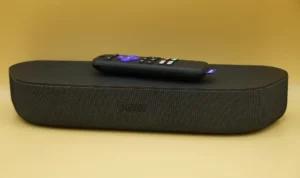
Wider Access to Content vs. Limited Choices for Content Roku’s primary advantage lies in its capability to provide users with an expansive array of content sources. This broader selection encompasses a wide range of streaming services, catering to diverse preferences. In contrast, while smart TVs also offer content through integrated applications, the options may be more confined compared to Roku’s extensive library.
Good Audio and Visual Quality vs. Better Audio and Visual Quality Both Roku and smart TVs strive to offer satisfactory audio and visual experiences. However, the inherent audio and visual quality of smart TVs might be superior due to their integrated capabilities and advancements in display technology.
Plug and Play vs. Requires Set Up Roku’s plug-and-play functionality allows for immediate usage after connecting the device to a TV. Smart TVs, on the other hand, may require initial setup, including connecting to Wi-Fi, signing into accounts, and navigating through menus to access applications.
Note on Internet Dependency While it’s possible to utilize Roku without an internet connection, it’s crucial to recognize that doing so might entail limitations. Without an internet connection, certain features and streaming capabilities will be inaccessible, potentially limiting the device’s functionalities.
In summary, the choice between Roku and a smart TV hinges on individual preferences and requirements. Roku offers a wider scope of content but requires an additional device, while a smart TV provides convenience and integration but with potentially fewer content choices.]
What TV manufacturers have Roku built in?
These are TV brands with built-in Roku:
- Roku
- TCL
- Westinghouse
- Hisense
- Sharp
Is it worth buying Roku for smart TV?
The decision of whether to invest in a Roku device for your smart TV holds value contingent upon your viewing habits.
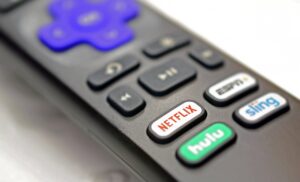
While some individuals may find Roku unnecessary in conjunction with their smart TVs, the personal relevance of this choice varies. Personally, I find that I can fulfill most of my content streaming needs through my smart TV or laptop, negating the requirement for a Roku device.
However, the appropriateness of acquiring Roku hinges on individual preferences and the specific genre of content one seeks to stream. It’s ultimately a choice influenced by your distinctive viewing inclinations.
How to Set Up Roku on Smart TV?
Setting up Roku on a Smart TV is a straightforward process that involves a series of simple steps to ensure a seamless streaming experience. Here’s a comprehensive guide to get you started:
Step 1: Connect Roku to Your Smart TV Begin by physically connecting the Roku device to an available HDMI port on your Smart TV. Use the provided HDMI cable to establish this connection. Once Roku is properly connected, power it on using the included power adapter.
Step 2: Pair the Remote After powering on the Roku device, ensure that the batteries are inserted into the Roku remote. The device and remote will automatically pair. This pairing process allows you to conveniently navigate the Roku interface using the remote.
Step 3: Connect Roku with WiFi Upon successful pairing, your Roku device will prompt you to connect to a WiFi network. Navigate through the on-screen instructions to select your network from the list of available options. Enter the WiFi password when prompted. This connection is essential for accessing online content and streaming services.
Step 4: Link Your Roku Account and Activate Next, your Smart TV screen will display a unique activation code. Use a computer or smartphone to visit the official Roku website and sign in (or create) your Roku account. Once logged in, follow the instructions to link your Roku device by entering the activation code provided on your TV screen. This step finalizes the connection between your Roku device and your Roku account, enabling seamless access to your chosen streaming services.
Wrapping it up
Regarding the question of whether smart TVs require Roku, the answer is negative.
The presence of Roku on your smart TV is not a necessity, given that smart TVs already offer a comprehensive array of content. Most content can be accessed directly on the smart TV itself. If curiosity beckons you to explore Roku, you can easily do so by downloading the Roku Channel app.
Nevertheless, the decision of whether your smart TV necessitates Roku rests upon your specific viewing habits. It’s worth noting that having both options can offer added versatility. In my perspective, a combination of both could be advantageous.
Ultimately, the choice between smart TV and Roku hinges on individual preferences, and the convenience of either option remains readily accessible.
You May Also Enjoy Reading: Roku Monthly Fee (Save $55 Charges!)
FAQs
Why would Roku be useful if you already possess a smart TV?
Answer: Roku TV provides a compelling option for individuals who own a smart TV. It offers affordable and high-quality smart TVs, catering to those who have cut the cord and wish to access their favorite streaming services directly on their television.
Roku’s technology and operating system contribute to the affordability of these devices, often making them a more budget-friendly choice compared to other smart TVs.
Is a streaming device still necessary when owning a smart TV?
Answer: While owning a smart TV eliminates the necessity for a streaming device, there are scenarios where a streaming device could be advantageous. This is especially true if you have specific requirements or possess an older smart TV.
Streaming devices offer access to a wider range of content. If you’re seeking endless entertainment options, a streaming device might be the superior choice.
